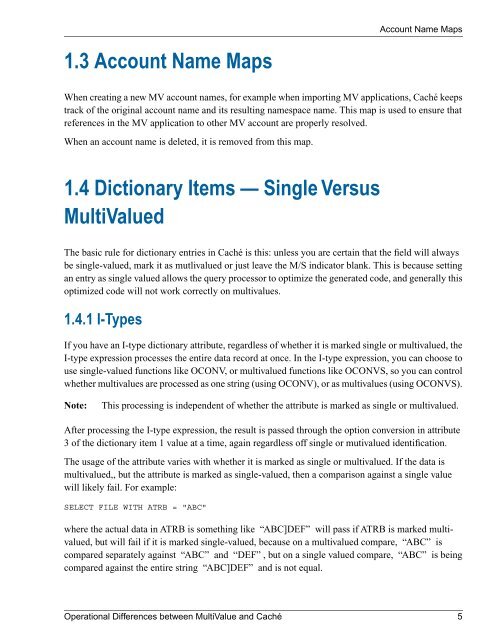Operational Differences - InterSystems Documentation
Operational Differences - InterSystems Documentation
Operational Differences - InterSystems Documentation
- No tags were found...
Create successful ePaper yourself
Turn your PDF publications into a flip-book with our unique Google optimized e-Paper software.
Account Name Maps1.3 Account Name MapsWhen creating a new MV account names, for example when importing MV applications, Caché keepstrack of the original account name and its resulting namespace name. This map is used to ensure thatreferences in the MV application to other MV account are properly resolved.When an account name is deleted, it is removed from this map.1.4 Dictionary Items — Single VersusMultiValuedThe basic rule for dictionary entries in Caché is this: unless you are certain that the field will alwaysbe single-valued, mark it as mutlivalued or just leave the M/S indicator blank. This is because settingan entry as single valued allows the query processor to optimize the generated code, and generally thisoptimized code will not work correctly on multivalues.1.4.1 I-TypesIf you have an I-type dictionary attribute, regardless of whether it is marked single or multivalued, theI-type expression processes the entire data record at once. In the I-type expression, you can choose touse single-valued functions like OCONV, or multivalued functions like OCONVS, so you can controlwhether multivalues are processed as one string (using OCONV), or as multivalues (using OCONVS).Note:This processing is independent of whether the attribute is marked as single or multivalued.After processing the I-type expression, the result is passed through the option conversion in attribute3 of the dictionary item 1 value at a time, again regardless off single or mutivalued identification.The usage of the attribute varies with whether it is marked as single or multivalued. If the data ismultivalued,, but the attribute is marked as single-valued, then a comparison against a single valuewill likely fail. For example:SELECT FILE WITH ATRB = "ABC"where the actual data in ATRB is something like “ABC]DEF” will pass if ATRB is marked multivalued,but will fail if it is marked single-valued, because on a multivalued compare, “ABC” iscompared separately against “ABC” and “DEF” , but on a single valued compare, “ABC” is beingcompared against the entire string “ABC]DEF” and is not equal.<strong>Operational</strong> <strong>Differences</strong> between MultiValue and Caché 5
















